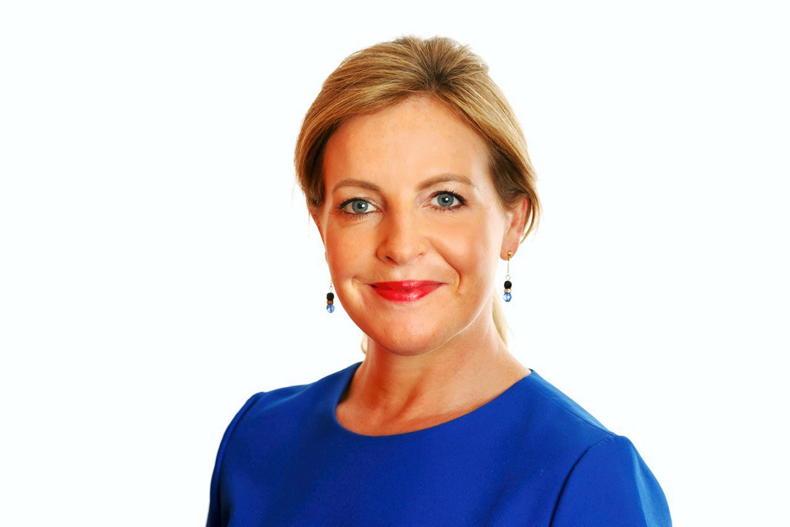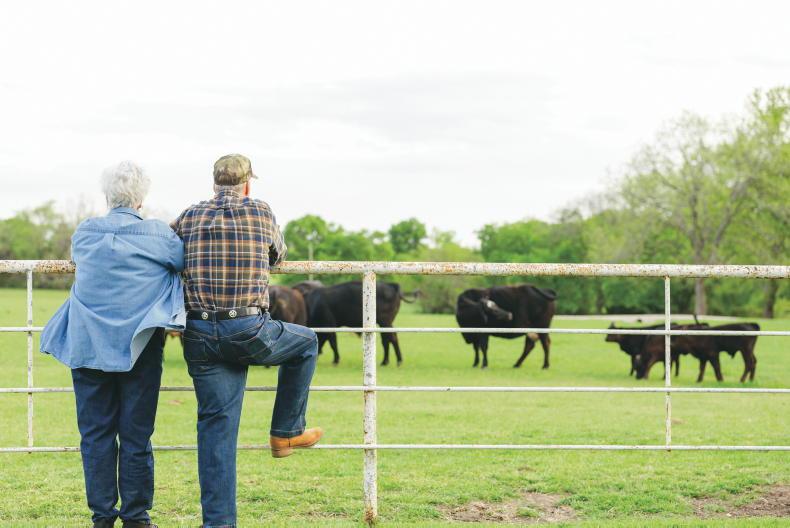Q I’m 45 and I’ve been married for the last 18 years. My husband is a farmer and I have three children, one of which works full time on the farm. Due to a recent injury my husband suffered, we have been reviewing our finances regarding retirement and estate planning. Our solicitor advised me that I may not qualify for any pension, and I want to know what my options are.
AYour solicitor is correct. Many farmers’ wives spend most of their lives working on the farm, but at retirement age find themselves in a weak position when it comes to pension entitlements.
The main issue here is that a farmer’s spouse is often not paid a direct income for the work they do, so their work is unrecognised by the Department of Social Protection when it comes to qualifying for the State contributory pension.

Carol Brick is managing director of CWM Wealth Management Ltd and HerMoney
If you are not being paid, you are not paying PRSI and therefore are not covered for a contributory pension. As a spouse of a farmer, rather than a paid employee of the farmer, you are also excluded from social insurance which includes maternity and disability cover.
Ultimately, any means-tested benefit payment is linked primarily to your spouse’s earnings.
To contribute to both the State pension and a private pension, you need to have a registered taxable income. It is important to be on the payroll - whether that’s in an employed/partnership format, or as self-employed - to put you in a better independent financial position in later years.
Speak to your accountant or financial advisor to ensure both of you are drawing an income from the farm in a tax efficient way, and to ensure you are both maximising your contributions to State and private pensions in terms of tax relief.
A good option is to put a formal business partnership in place between you as a married couple, where one spouse is seen as an employee of the farm. You each would then qualify for your own State pension, once you have made the required number of PRSI contributions, and will also be entitled to contribute to a personal pension as you would both be PAYE taxpayers.
Q I did work in a local supermarket full-time before having my children and working on the farm. Does that make a difference to what pension I can get?
A Many people (it has traditionally been women) take time off work to mind children or elderly dependents. During this time, they may qualify for social insurance contributions through the Homemakers Scheme, but they may not be in a position to contribute to their private pension. It is important to get advice from a financial expert. They can look at how much you have contributed to the State pension through social insurance contributions, as well as any private pension, and advise on how best to fill the gap.
It is possible to put a good support in place - even if you didn’t work for a few years - but it’s a situation that should be addressed sooner rather than later to benefit fully from tax relief and pension entitlements.
To qualify for a State pension or private pension, you need to have a registered taxable income. So, for those who farm with their spouse, as advised, you should get on the payroll as soon as possible.
We normally find that the spouse of a farmer will be entirely reliant on their spouse’s pension; despite maybe having worked their entire life on the farm. However, there is a scheme operated by the Department of Employment Affairs and Social Protection where you can seek to have your contribution to the farm recognised retrospectively.
How much do I need when I retire?
There is a lot that can be done even ten or 15 years out from retirement to maximise a pension fund. Once any children have flown the nest, this may free-up some cash that can be invested in a pension. Generous tax relief is available from the Government on payments into revenue approved pension schemes. Talk to your accountant or financial advisor to ensure you are on track by identifying what income you can expect from various pension contributions.
Check your State pension entitlement and your projected private pension income, and consider any other sources of income - for example, from leasing land, rental properties, or investments. Evaluate what your likely income is going to be, and what your retirement living expenses will be, to see if you have a shortfall.
When you are drawing down your retirement benefits from a private pension, you have a couple of ways in which to take your income. Both retirement choices will pay you a tax-free lump sum. Many people use this lump to pay off their mortgage, if choosing to retire before the end date of the mortgage. Others use the lump sum to supplement the gap in income from when they retire to when the State pension age will kick in.
As we get older, costs associated with the home and children often lessen, but we can end up with more medical expenses or energy costs. Consider health insurance and life cover within your provision for ageing. Even checking monthly bank and credit card statements now will give you an idea of what you will need in retirement. Some people will choose to work part-time beyond retirement age, and others may have plans to travel the world.
A good look at your income, your assets, your regular outgoings and your pension entitlement or investments now will mean peace of mind and potentially a more comfortable and secure retirement.
Carol Brick hails from a dairy farming background in Kilmoyley, north Kerry, and is managing director of CWM Wealth Management Ltd and HerMoney. An economics graduate and qualified financial adviser (QFA), she provides financial planning and wealth management solutions to a variety of professional individuals and corporate interests; covering retirement planning, protection requirements, savings, investments and personal finance advice.
She has a particular interest in the distinct area of financial planning for women in Ireland and launched a specialist service, HerMoney, in 2017, with an all-female team of advisors. Carol advocates for urgent legislative change when it comes to the qualifying criteria for a State pension.
Ask Carol
Have a question for
Carol about pensions, finance or retirement planning? Email advice@farmersjournal.ie
Read more
The Fair Deal scheme broken down
Agricareers:“Your career is a journey, not a destination”; Sarah Donnelly, Kepak
Q I’m 45 and I’ve been married for the last 18 years. My husband is a farmer and I have three children, one of which works full time on the farm. Due to a recent injury my husband suffered, we have been reviewing our finances regarding retirement and estate planning. Our solicitor advised me that I may not qualify for any pension, and I want to know what my options are.
AYour solicitor is correct. Many farmers’ wives spend most of their lives working on the farm, but at retirement age find themselves in a weak position when it comes to pension entitlements.
The main issue here is that a farmer’s spouse is often not paid a direct income for the work they do, so their work is unrecognised by the Department of Social Protection when it comes to qualifying for the State contributory pension.

Carol Brick is managing director of CWM Wealth Management Ltd and HerMoney
If you are not being paid, you are not paying PRSI and therefore are not covered for a contributory pension. As a spouse of a farmer, rather than a paid employee of the farmer, you are also excluded from social insurance which includes maternity and disability cover.
Ultimately, any means-tested benefit payment is linked primarily to your spouse’s earnings.
To contribute to both the State pension and a private pension, you need to have a registered taxable income. It is important to be on the payroll - whether that’s in an employed/partnership format, or as self-employed - to put you in a better independent financial position in later years.
Speak to your accountant or financial advisor to ensure both of you are drawing an income from the farm in a tax efficient way, and to ensure you are both maximising your contributions to State and private pensions in terms of tax relief.
A good option is to put a formal business partnership in place between you as a married couple, where one spouse is seen as an employee of the farm. You each would then qualify for your own State pension, once you have made the required number of PRSI contributions, and will also be entitled to contribute to a personal pension as you would both be PAYE taxpayers.
Q I did work in a local supermarket full-time before having my children and working on the farm. Does that make a difference to what pension I can get?
A Many people (it has traditionally been women) take time off work to mind children or elderly dependents. During this time, they may qualify for social insurance contributions through the Homemakers Scheme, but they may not be in a position to contribute to their private pension. It is important to get advice from a financial expert. They can look at how much you have contributed to the State pension through social insurance contributions, as well as any private pension, and advise on how best to fill the gap.
It is possible to put a good support in place - even if you didn’t work for a few years - but it’s a situation that should be addressed sooner rather than later to benefit fully from tax relief and pension entitlements.
To qualify for a State pension or private pension, you need to have a registered taxable income. So, for those who farm with their spouse, as advised, you should get on the payroll as soon as possible.
We normally find that the spouse of a farmer will be entirely reliant on their spouse’s pension; despite maybe having worked their entire life on the farm. However, there is a scheme operated by the Department of Employment Affairs and Social Protection where you can seek to have your contribution to the farm recognised retrospectively.
How much do I need when I retire?
There is a lot that can be done even ten or 15 years out from retirement to maximise a pension fund. Once any children have flown the nest, this may free-up some cash that can be invested in a pension. Generous tax relief is available from the Government on payments into revenue approved pension schemes. Talk to your accountant or financial advisor to ensure you are on track by identifying what income you can expect from various pension contributions.
Check your State pension entitlement and your projected private pension income, and consider any other sources of income - for example, from leasing land, rental properties, or investments. Evaluate what your likely income is going to be, and what your retirement living expenses will be, to see if you have a shortfall.
When you are drawing down your retirement benefits from a private pension, you have a couple of ways in which to take your income. Both retirement choices will pay you a tax-free lump sum. Many people use this lump to pay off their mortgage, if choosing to retire before the end date of the mortgage. Others use the lump sum to supplement the gap in income from when they retire to when the State pension age will kick in.
As we get older, costs associated with the home and children often lessen, but we can end up with more medical expenses or energy costs. Consider health insurance and life cover within your provision for ageing. Even checking monthly bank and credit card statements now will give you an idea of what you will need in retirement. Some people will choose to work part-time beyond retirement age, and others may have plans to travel the world.
A good look at your income, your assets, your regular outgoings and your pension entitlement or investments now will mean peace of mind and potentially a more comfortable and secure retirement.
Carol Brick hails from a dairy farming background in Kilmoyley, north Kerry, and is managing director of CWM Wealth Management Ltd and HerMoney. An economics graduate and qualified financial adviser (QFA), she provides financial planning and wealth management solutions to a variety of professional individuals and corporate interests; covering retirement planning, protection requirements, savings, investments and personal finance advice.
She has a particular interest in the distinct area of financial planning for women in Ireland and launched a specialist service, HerMoney, in 2017, with an all-female team of advisors. Carol advocates for urgent legislative change when it comes to the qualifying criteria for a State pension.
Ask Carol
Have a question for
Carol about pensions, finance or retirement planning? Email advice@farmersjournal.ie
Read more
The Fair Deal scheme broken down
Agricareers:“Your career is a journey, not a destination”; Sarah Donnelly, Kepak










SHARING OPTIONS